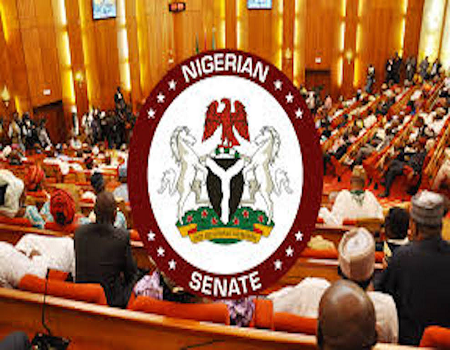The Senate has passed for second reading the Constituency Projects (Budgetary Provision) bill which seeks to give a legal framework to the initiative by lawmakers to site projects in their respective constituency.
The bill is seeking allocation of 20 per cent of the national budget to fund constituency projects across the country.
Sponsor of the bill, Senator Oduah, Stella Adaeze (Anambra North) said the bill was designed to cater for the needs of 70 per cent of Nigerians who live in the rural communities to feel the presence of Nigerian.
According to Oduah, “permit me to lead the debate of this important Bill Which seeks to grant legal backing to the provision of Constituency Projects in the Annual Budget of the Federation by a minimum of 20%.
“The Constituency Projects shall constitute 20% of the Annual Budget by ensuring that certain portion of the nation’s annual budget be set aside for rural development,” Oduah said.
Projects under this Act, when passed, shall be community-based in order to ensure that the prospective benefits are available to a widespread cross-section of the inhabitants of a particular area.
The proposal also stated that any funding under this act shall be for a completed project or a defined phase of a project and may include the acquisition of land and buildings.
Accordingly all projects, shall be projects as defined under this act when passed and may include costs related to feasibility studies, planning and design or other technical input for the project but shall not include recurrent costs of a facility.
It also said that projects may include the acquisition of vehicles, machinery and other equipment for the constituency.
The Bill was read for the First time on the floor of the Senate on Tuesday, 19th November‘ 2019.
“One of the unique features of our democratic journey so far is the concept of ’Constituency Projects’. Available statistics show that seventy (70%) per cent of Nigerians live in rural areas and the intention of the bill is to ensure that good governance is delivered to these crucial areas.”
She said the bill is also intended to correct the top-bottom approach of governance and replace it with the bottom-top approach.
The Anambra North Senator argued that constituency projects in recent times is one of the ways to attract federal presence to the people.
She argued further that if not for these projects, the majority of federal constituencies would not have a single federal project due to the lopsided nature of project allocation in the budget. The constituency props! is not peculiar to Nigeria alone.
She said there are examples from other jurisdictions on the import of the bill and it’s impact on the citizenry.
She said, for instance, the constituency development fund was institutionalized in Kenya, Uganda, India and Tanzania.
She said instead of vilifying the National Assembly lawmakers on the constituency project, the public should advocate for an institutional framework for the implementation of the constituency projects as it is the case in Kenya.
ALSO READ: Reps task FG on dredging of Oke-Afa Inland Waterways, Lagos
Oduah said the bill would, therefore, attempt at providing both institutional and legislative framework for the operation of constituency projects in Nigeria thereby making it part of our National Budget.
While it is true that Local Government council has the responsibility of the development of local communities, the Federal Government has the overall responsibility of providing federal presence in these areas through developmental projects and there is no way this can be achieved without the input of the parliamentarians who are the representatives of the people at the federal level.
Explaining the political benefits of the initiative, Oduah stated most legislators around the world angle for such projects such that they can appeal to the voters in their constituents since they seek votes just as the executive does.
It would be recalled that lawmakers have been at a logger ahead with the executive on the legality or otherwise of constituency projects.
Only recently, the former minister of power works and housing, Babatunde Fashola had in his long battle with the lawmakers over the propriety of constituency projects in the face of dwindling revenue to meet legacy projects that would serve the more than one state to localized projects.






